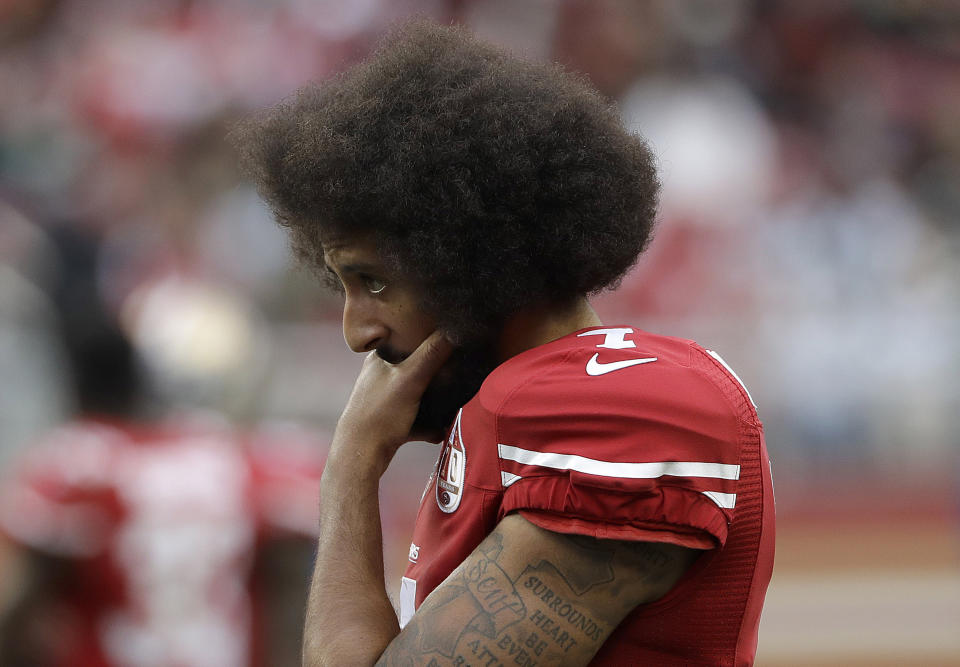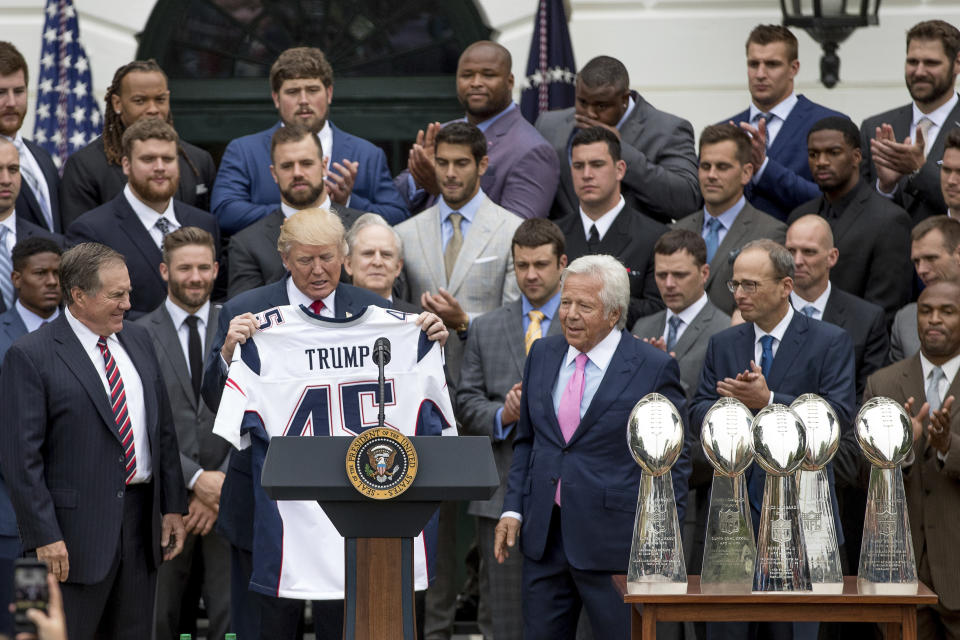With President Donald Trump on way out, Colin Kaepernick’s NFL window is closing — not opening
More than five months ago, when the NFL’s tone on peaceful gameday protests appeared to be changing across the board, an unexpected sense of optimism about Colin Kaepernick trickled out of the league office and a small handful of franchises.
A swath of teams had spent a large portion of June expressing disdain over recent incidents of police brutality and racial injustice. Players were rallying across the country and pointing their spotlight toward the killings of George Floyd, Breonna Taylor, Ahmaud Arbery and others. Even commissioner Roger Goodell made a statement of support for the Black Lives Matter movement, while apologizing to kneeling players and promising to rededicate the NFL’s efforts toward social justice. And inside it all, a tiny pocket of optimism grew inside the league, suggesting that in the midst of changing attitudes, a window for Kaepernick’s NFL return was opening.
It came with one caveat: Whoever was willing to take a leap on Kaepernick would have to accept being political fodder for a man with an extremely powerful bullhorn.
For a long time, this has been the last whispered rebuttal for many NFL teams refusing to even look at Kaepernick. By last summer, essentially every other fabricated pretense had been dispelled in a 17-point fact sheet distributed by the quarterback’s agent. It dispatched myths that Kaepernick was demanding a starting job; shot holes in claims that he was demanding a wild salary; and slammed fabrications about teams having offered jobs or workouts, as well as a host of other red herrings purporting to explain why Kaepernick was jobless. Even after that statement was released in October 2019, one underlying anxiety allegedly lingered: That any signing of Kaepernick would instantly paint a target on the logo of the franchise bringing him in, and that Trump would use his immense spotlight to focus on that target.

In some quarters, this was the weak storyline that was advanced after a fraudulent uptick of interest in Kaepernick was reported last summer. Anyone remember that? After the supposed change in the league’s attitudes toward kneeling players and peaceful protests — which even included Goodell effectively apologizing to Kaepernick for not listening to him in 2016 — there were multiple reports that Kaepernick was getting renewed interest from some teams. So much so, Seattle Seahawks head coach Pete Carroll even said it on the record, prompting suggestions that perhaps the NFL had turned a corner on a potential Kaepernick return.
That was all a mirage, of course. Sources in Kaepernick’s camp reiterated the same thing that they’ve been saying for years: There has been no legitimate interest from any NFL team. No offers of a workout. No angling to add him to a roster. Nothing to indicate that a four-season cold shoulder was going to change anytime soon, if ever at all.
And when you asked what happened to the supposed interest or whether it was real, the answer was little more than a quagmire of the same things that have been swirling around Kaepernick for years. But inside that, there has always been one common denominator of a president who would most definitely be drawn into a conversation about Kaepernick’s NFL return and the kneeling that would undoubtedly ensue in his first game back.
Was Donald Trump a real factor keeping Kaepernick out of NFL?
Right up until the November election, this reality remained the most convenient possible excuse for franchises and the NFL at-large. So long as Trump was president, he was a threat to the league, carrying a significant bullhorn to spout criticism from the most powerful political office in the world. But with Trump’s election defeat this month, that presidential bully pulpit calculus for the league technically should change. That is, if you believe Trump has ever been anything more than a convenient excuse for teams that have never really wanted anything to do with Kaepernick in the first place.
Because one thing is about to be undeniable. This is it. This is the final shot and the last offseason when anything could realistically change for Kaepernick. Either he squeezes through the window post-Trump, or the window has long been closed and we’ve been wasting our breath talking about it.
The last and most influential non-football justification for an NFL team refusing to look at Kaepernick is about to lose its foothold. Trump won’t have the presidential platform that made his comments about the league instantaneous news. Reporters won’t have to transcribe his insults from a rally. Cameras won’t be tuned in as he walks across the White House lawn. And he won’t be able to summarily invent a fictional event like a summit on race with athletes (which never happened) or a meaningless sports advisory commission that wrangles in multiple parts of the NFL (which accomplished nothing).
When Trump is out of the Oval Office, the NFL can easily choose to treat him the way it did before he won the 2016 election: Like a petulant child who was never going to be worthy of the franchise he so badly wanted to buy; and someone who could be ignored as a social media nuisance rather than a man who could reshape a tax code and make team owners hundreds of millions of dollars (if not billions).

This is all germane to Kaepernick’s situation for one reason. It takes away one final justification for him never being able to sniff a chance at an NFL return. Like the cutting down of past excuses, it peels back one final layer of intellectual dishonesty and gets everyone closer to the truth, which is this: Trump hasn’t been a reason for Kaepernick being jobless in a long time. Instead, he has been a tool of convenience. So long as he has been in a position to be a presidential bully — capable of making phone calls that franchise owners had to take — NFL teams could shrug behind the scenes and say, “We couldn’t even sign Kaepernick if we wanted to, because then we’d have to deal with this guy for however long he was in the White House.”
That’s the interesting thing about Trump’s departure where it concerns Kaepernick. It’s not the widening of a new window of opportunity. It’s the closing of the same window that has always been sliding shut ever since the league initially brushed aside Kaepernick. It’s a reality that tells us if Trump is out of office and NFL teams still won’t take a single look at Kaepernick, it means that Trump was never a factor in these past few years. It means that for quite a while, and maybe always, this has been about how team owners view Kaepernick as a person, activist, dissident or powerful voice in a social justice movement comprised largely of Black people.
Is 4 years too long a layoff for Kaepernick to return?
That doesn’t mean a new excuse can’t be invented or even presented with legitimacy. After all, there’s no denying that Kaepernick being out of the NFL for the past four years has damaged his value as a player. It’s almost impossible to be out of the league for that long and come back and be serviceable. We have to use the phrase almost because we have seen one fairly impressive exception to that belief in 2020 in the form of one of Kaepernick’s ex-San Francisco 49ers teammates, no less.
For those who haven’t been paying attention, Dallas Cowboys defensive end Aldon Smith returned to the NFL this year after a four-year absence and has been a valuable part of that franchise. This comes after the Cowboys shocked much of the league by signing Smith in April, producing a reaction that drew the same kinds of questions everyone would have about Kaepernick if he were to land an NFL job in the coming offseason. Queries like, “What kind of contributor could he be after all this time?” and “Is this just desperation?”
If anything, Smith’s signing was painted as a shot in the dark with little downside. If he worked, great. If he didn’t, hey, it was worth it just to be sure there wasn’t anything left in the tank. That it has worked out so well, with Smith being arguably the lone free agent bright spot from Dallas’ offseason class, has been frosting on a terrible season.
A Kaepernick signing wouldn’t be viewed in the same kind of light. People would point to the quarterback position and say that it’s a much more difficult transition back after four years. And they’d say this even though the NFL has trended more toward Kaepernick’s style of play over the past four years. And if Kaepernick’s position wasn’t a concern, it would be that he’s a more complicated signing in terms of the iconic status he has achieved outside of football — given that he’s arguably become a bigger symbol by not playing over the past four years.
This is all speculation about a signing that will likely never happen. It likely feels familiar because it’s the same place it stood a week ago, a month ago, a year ago — and soon enough, an entire president ago.
Time moves on. Excuses fall to the wayside. And Kaepernick continues to reside on the outside, looking through a window that is coming to its final closure. If that doesn’t change in the first offseason in a post-Donald Trump era, it never will.
And it likely never was.
More from Yahoo Sports:
